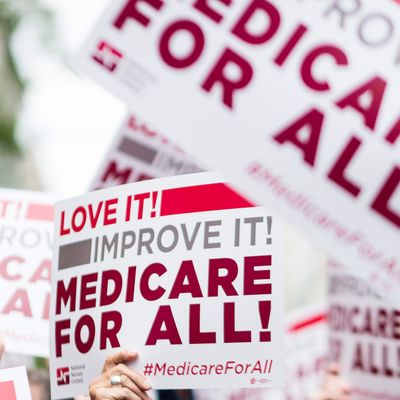
Joe Biden’s first heavily telegraphed “gesture” toward supporters of Bernie Sanders after the Vermont senator’s withdrawal from the 2020 race was a slight move to the left on student-loan debt and health care. The first really important reaction from a prominent Sanders supporter, Alexandria Ocasio-Cortez (during a New York Times interview), focused on the latter issue, and it was not positive:
They floated this olive branch to the progressive left of lowering the Medicare age to 60. And it’s almost insulting. I think Hillary was looking at policies that lowered it to 50. So we’re talking about a “progressive concession” that is 10 years worse than what the nominee had in 2016.
Anyone looking objectively at the distance between Biden and his public-option proposal and Bernie Sanders’s version of Medicare for All would agree that Biden’s “concession” was minuscule at best, unless you think including the word “Medicare” in his plan is worth its weight in gold. And at a time when Sanders himself and surrogates like AOC keep pointing to exit polls showing that a lot of Biden’s own supporters seem to like M4A, you’d think the putative nominee would feel more pressure to move in that direction more decisively.
Perhaps Team Biden is influenced by the fact that recent (late-March) polling on health care by the Kaiser Family Foundation shows self-identified Democrats support Medicare for All and Biden’s own public-option proposals by roughly equal measures. Forty-nine percent strongly favor M4A as a replacement for private health insurance, and 30 percent somewhat favor it, while 46 percent strongly favor a public option competing with private health insurance and 36 percent somewhat favor it. Considering the large philosophical gulf between the two approaches and the sizable difference in the public-revenue price tag (something Biden talked about a lot during the nomination contest), that’s not much of a difference. Meanwhile, the same survey shows 72 percent of independents and even 46 percent of Republicans supporting the public option, as opposed to 49 percent and 25 percent, respectively, favoring M4A.
Yes, there is an upward drift since the coronavirus appeared in support for M4A generally, but no evidence so far that it exceeds support for more incremental approaches among Democrats or the national electorate. So you can see Team Biden, particularly now that it’s got the nomination in hand, deciding more or less to stand pat.
The trouble is, of course, that even if rank-and-file Democrats don’t act as though they think there’s a big difference between M4A and Biden’s public-option scheme, the progressive opinion leaders they need to unite the Democratic Party most definitely do, and, like Sanders and AOC, they’re not going to be quiet about it. If last week’s “insulting” offer of a small reduction in the eligibility age for the existing Medicare program is the best Biden is going to do on that front, it will chafe. And meanwhile, the public-health situation and the growing tolerance of Americans of all parties for more aggressive federal intervention could make the perceived general-election “price” of harpooning this progressive Great White Whale much easier to pay for Biden.
What is Uncle Joe to do? His basic choices are (a) to stay where he is and hope that Sanders voters and other progressives back him against the Evil One, even if they are deeply dissatisfied with the nominee’s policy positions; (b) find areas other than health care in which to make concessions to the left (e.g., student loans, immigration, or coronavirus economic relief); or (c) move toward Medicare for All in a visible way without entirely repudiating his prior position.
This last approach might involve appropriating the position of Elizabeth Warren who, after hanging tough on Total and Instant M4A for much of the campaign, ultimately moved to a two-phase proposal in which a public option would lead to M4A once the advantages became manifest, as CNN explained:
During the first phase, Warren would use the Senate budget reconciliation process to pass legislation that would immediately offer Medicare for All’s full suite of benefits — at no cost — to children under 18 and people at up to 200% of the poverty level, around $51,000 in income for a family of four. The option would be open to any American who wants to use it, but they would have to pay for it, though costs would decline over time. Additionally, the legislation would lower the current Medicare eligibility age to 50 from 65, while also expanding the program’s benefits and lowering what enrollees have to pay.
It’s unlikely that Biden would want to go as far as Warren did, but the key would be recognition of a single-payer system like Medicare for All as an ultimate goal, with an interim proposal including a public option and a Medicare expansion. And standing back from a full M4A plan would presumably insulate Biden from too much blowback among independents who want to keep their private insurance plans, at least for the immediate future.
Whether or not this approach appeals to him, Biden needs to start making serious concessions to the left on health-care policy or let it be known quietly that he’s gone as far as he can. If there’s anything good about the coronavirus pandemic, it’s the new context it creates for policy proposals thought to be too extravagant earlier.






























